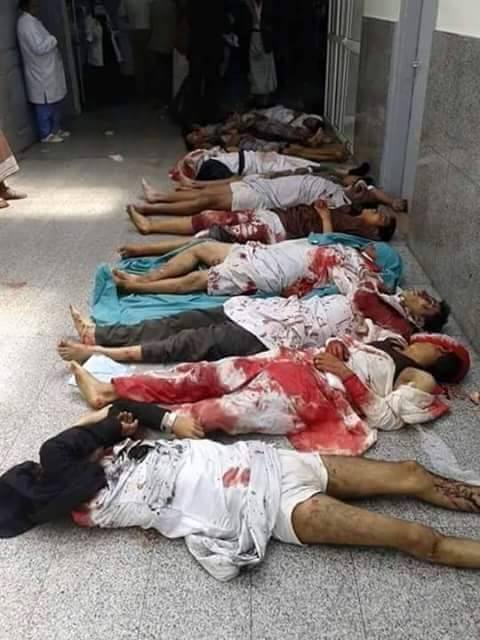By Khaled Al-Hamdani
Taiz, Yemen—Before the ongoing deadly war began in March 2014, Yemen was a country where more than seven million people lived under the poverty line, according to the World Bank. For three decades there was no perfect stability so that investment plans often failed. The unemployment rate reached 60%. Now—under the current internal war and the blockade imposed by the Houthis and Ali Abdullah Saleh’s loyalists, and the external war waged by the Saudi-led coalition to prevent the Houthis from taking full control of the country—you can imagine how the situation is. In Taiz governorate, the street conflicts are brutal in this city of four million civilians. Taiz has been largely occupied and heavily bombarded by the Houthis and Ali Abdullah Saleh’s militias for five months.
Civil society organizations declared in a press conference in Taiz last month that 194 children have been killed by Houthis and Saleh’s militias since the conflicts broke out here in April. Sixty-three others were killed by Saudi-led coalition airstrikes.
Economic problems are worsening crazily because of this war, but that is no longer the only major problem in Yemen. There are at least four major problems/risks being horribly worsened as the war continues. They
are: famine, epidemics, the expansion of extremist groups, and sectarianism.
FAMINE
What do you expect the situation is in a country under the control of extremist groups and two wars? What choices do Yemeni civilians have? The UN had already announced that 20 million Yemenis are in dire need of food. UNICEF declared that children are at particular risk. There is no electricity, oil, medicine or work. As a result of seizures by militias, many necessities of daily life are unobtainable and/or overpriced. The Houthis force businessmen to pay high illegal taxes. They also take the lion’s share of any imported oil for their own militants and steal humanitarian aid. Many local companies and factories that produce the necessities for daily life are in Taiz and have shut down due to severe street conflicts and the city being seized and bombarded by the Houthis and Ali Abdullah Saleh’s militias. Many photos and videos show people in Taiz using smuggling routes to deliver medicine and foodstuffs. Factories and companies in the capital, Sana’a, also stopped producing due to the Saudi-led coalition airstrikes. Many factories in Hodaidah and other cities were targeted either by the Houthis or Saudi-led coalition airstrikes. For all these reasons there is now real famine in Yemen.
EPIDEMICS
Among the blocked factories and companies were ones producing sanitary and medical supplies and tools. Many patients suffering diseases and injuries have died due to lack of medicine and medical supplies. As the need for more medical services and doctors became urgent, many medical workers and experts left the country. Many hospitals closed, especially in Sana’a and Taiz, due to the lack of electricity, fuel, medical equipment and medicine. Last week all the hospital administrators in Taiz complained because of lack of oxygen and other medical necessities. The hospitals’ management sent a letter to the Secretary-General of the UN, Ban Ki-moon, appealing for medical aid. They also called for an end to the extensive seizures of medical and other supplies imposed on Taiz by the Houthis for five months. Many diseases have spread widely and killed scores of civilians. According to civil society organizations, there are 3,400 cases of dengue fever in Yemen, most of them in Taiz and Aden.
EXTREMIST GROUPS AND SECTARIANISM
Expansion of extremist groups is one of the main threats to the present and future of Yemen. The war has allowed extremist groups to gather a lot of money and weapons. It allows them to train their followers wherever they want. These groups have recruited many of Yemen’s youth, exploiting poverty, unemployment and lawlessness. Expansion of the extremist groups is a great obstacle to establishing a civilian state in Yemen.
The Houthi movement is an extremist religious Shiite group, whose expansion is very worrisome to the Sunni extremists. It’s obvious that each of these groups’ expansion stimulates the growth of the other. In the last few months horrible activities appeared for the first time in Yemen: the only church in Aden was burned on Sept. 15 by unknown militants, thought to be related to extremist groups; many Shiite mosques in Sana’a were blown up by suicide bombers, the first time this has happened in Yemen. The blasts were thought to be a reaction to the war waged by the Houthis and their allies, who have destroyed some Sunni mosques and displaced people in Sada, Sana’a and Amran, where most of the population are Shiite.
Houthis, and most of their allies, come from northern Shiite governorates and the war seems to be sectarian. Houthis get support from Iran and there are some Sunni groups that relate to Saudi Arabia. No city in Yemen has perfect stability. Even in Aden and the nearby governorates, where the popular resistance has successfully expelled the Houthis and Saleh’s militias, other extremist groups such as Al Qaeda and Ansar al-Sharia replaced the Houthis. They took control of some provinces in Aden, e.g., Al-Tawahi and Creter. The city of Al-Mukalla is still under the control of Al Qaeda militants.
These extremist groups fight with each other, and at the same time, all of them fight the socialist and liberal parties and activists. The socialist and liberal parties and activists are the first target of all the extremist groups.
If the president, Mansour Hadi, and the rest of the official army don’t take full control of the regions after expelling the Houthis and Saleh’s militias, the scenarios of Libya and Syria will be repeated in Yemen and it will be difficult for the rule of law to be reestablished in the future.





